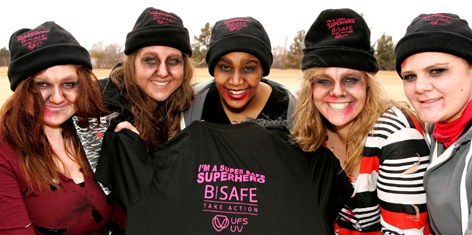Latest News Archive
Please select Category, Year, and then Month to display items
12 January 2024
|
Story Nonsindiswe Qwabe
|
Photo Sonia Small
 Since joining the UFS in 2008, Dr Grey Magaiza has worked extensively on approaches that can foster the socio-economic transformation of societies.
Since joining the UFS in 2008, Dr Grey Magaiza has worked extensively on approaches that can foster the socio-economic transformation of societies.
“The future should be one where communities can decide on their development agenda and futures. That’s the most important for me.” Dr Grey Magaiza, Deputy Director of the Centre for Gender and Africa Studies (CGAS) and Head of the Community Development programme on the Qwaqwa Campus, is passionate about capacitating communities to be agents of change and advancement. His vision for the future emphasises the empowerment of communities to take charge of their development by actively participating in decision making and the implementation of development projects that can improve their lives.
Since joining the UFS in 2008, Dr Magaiza has worked extensively on approaches that can foster the socio-economic transformation of societies. Over the years, he has crafted his research speciality into one that he is most proud of – being an interdisciplinary scientist immersed in the development of communities.
“I’m in a fortunate position of researching what I like. I say ‘fortunate’, because I’ve taken the time to understand what I’m passionate about, which is the overall field of rural livelihoods and livelihood futures – in short, community development. My research starts from an engaged university, understanding the elements that a university must use to enhance transformation and relevance to its immediate community in terms of development.”
One of the ways he has done this is by looking at social entrepreneurship as a development approach for young people in a rural setting. Through workshops with non-profit and civic organisations in Qwaqwa, Dr Magaiza has been helping these organisations to map out their needs and actively meet them through the involvement and support of external role players.
“We understand that communities are part of the national development agenda, but even that national agenda respects community knowledge and intentions and allows communities to shape their identity. A critical enabler of this is community organising. You bring back the capacity in communities to have dialogues on issues affecting them as spaces for engagement, knowledge exchange, and for people to just talk about their way forward.”
By enabling communities to define their development agenda, they can address their specific needs, challenges, and aspirations, he said. “When I look at livelihood futures, it’s quite an exciting aspect of my work – it’s like looking into a fortune tellers’ globe, because you’re not deciding for communities what they should do, but the communities themselves take those decisions.”
Running not just for fun
2014-08-11

Running is not always just for fun – or even exercise. Running can also help to raise awareness for family, safety and social responsibility.
As part of the 2014 Intravarsity programme, the Student Representative Council (SRC) of the Bloemfontein Campus organised a Women’s Day Fun Run for staff, students and members of the public. Proceeds of the 4 km race were donated to Families South Africa (FAMSA). This organisation highlights a safe and healthy functional family life as a national priority.
Although the event was marked with laughter and giddiness, it also focused attention on the university’s drive to make our campus a safe space – especially for our women. Those participants who best portrayed a message of anti-violence received branded t-shirts and beanies. Of these winners were a group of young ladies who used cosmetics to make themselves look assaulted. They each received the uniquely-branded merchandise displaying, ‘I’m a super safe super hero’.
The Women’s Day Fun Run reminded women to be aware of their surroundings and invest in their personal well-being. It also served to remind men to be respectful, watchful and actively involved in protecting the women and families in their lives.